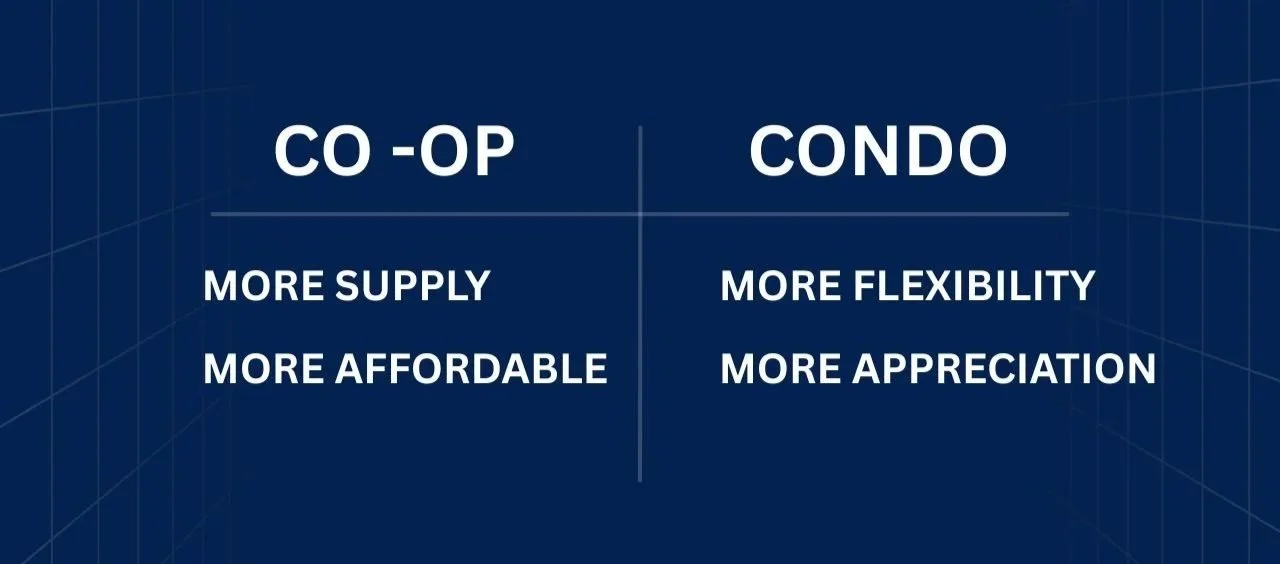The difference between a co-op and a condo in NYC.
June 30, 2025
If you buy in NYC, you’re probably buying a co-op or condo. Are you sure about the difference??
Dear friends,
Back in May 2020, I was two months into the New York City Covid lockdown, going a little stir-crazy.
I would leave my apartment every 10 days to buy groceries from around the corner. Fantasizing about a different life through StreetEasy-surfing was becoming a favorite past-time.
I saved many listings with brick walls, private terraces, and wood-burning fireplaces. As soon as the lockdown was lifted, I decided to go apartment shopping with my boyfriend.
It was the year before I officially got my real estate salesperson license, and I thought I had the homebuying thing under control, sans broker, especially with my attorney boyfriend who could get us the buyer’s broker commission with his law license.
We fell in love with a Brooklyn Heights brownstone triplex. It was a co-op.
All I knew was that there was going to a lot of paperwork, and we would have to be interviewed.
But I had no idea what it really meant to buy into a co-op: that I might not be able to easily rent it out if I grew out of the apartment or moved away; that I wouldn’t own title of the apartment; that I might not be able to sell it to foreign buyers, students, or someone who the co-op board simply doesn’t like!
We never got to the board approval stage, because I decided to play hardball on the negotiations and didn’t increase a penny from our initial low offer, when we were met with a good counter. The listing agent ended up selling it at the asking price shortly after.
And while I missed out on the home I wanted, I started contemplating getting a real estate license.
Within 12 months, I launched a whole new career that, 4 years in, I am more committed to than ever.
Today, I want to shed light on a topic that a lot of people (including my 29-year-old self) in New York may think they know but may in fact be confused about.
What’s the difference between a co-op and a condo?
The most important difference: ownership!
Buying a condo is much more similar to buying a house—you’re buying actual real property, with a title and your name on it. If you stop paying your mortgage or real estate taxes, the bank or the government can foreclose on your property.
Buying a co-op is not buying real property. It’s more like getting into business with your neighbors in the same building. You’re actually buying shares of a company that owns the entire building. Along with the certificate of shares, you get a “proprietary lease” which entitles you to live in your particular unit for as long as you own your shares of the co-op.
If you stop paying your bills, your neighbors might have to pick up your slack. Do you see why co-ops might have a harsher approval process than condos now?
Benefits of buying a co-op
More supply: Over two-thirds of New York City housing stock is co-ops! That means more inventory to choose from, and sometimes you might just fall in love with an apartment that happens to be a co-op, like that Brooklyn Heights brownstone triplex I still ache over.
More affordable: More supply also means more affordability. For the same studio or one-bedroom, a co-op is likely asking 35% less than a condo. More often than not, that co-op studio is also larger than a condo studio. This makes a big difference in an expensive city like New York!
There’s a reason it’s cheaper, though—more on this later—and it’s also important to remember that co-ops often appreciate less in value than condos.
Benefits of buying a condo
More flexibility: Condos are more flexible in all the following aspects—financing terms, ownership requirements, approval process, and post-closing liquidity requirements. You can put down as little as 10% down payment, be a student with no income, or a foreign investor who will be renting out from day 1, or buy as a trust, or have three large dogs above 60 lbs. each, or have no more than 6-12 months of post-closing liquidity (total monthly payment of mortgage plus common charges and real estate taxes).
More appreciation: Thanks to their flexibility, condos have a much larger buyer pool than co-ops, and they generally enjoy more demand than co-ops. This translates to more appreciation in property value over time.
Downsides to buying a co-op
Harsh rules: Co-ops usually don’t allow subletting beyond a very limited amount of time, and many of them have strict rules around how and when you can renovate your own apartment! The co-op board approval process is typically more onerous than a condo’s board process, though it is important to note that both condos and co-ops have board packages! The main difference is the condo only has a right of first refusal, so if the condo turns down the board application, it has to purchase the unit itself. A co-op, on the other hand, can reject any buyer (without even giving a reason) after the buyers submit a novella-length board package and go through a nerve-wrecking interview.
Higher assessments: Though not a given, many co-ops are older buildings that have aging infrastructure: leaky windows that need replacing, plumbing and electric that need upgrading, elevators that are shaking a tad much, and oil-burning boilers that are bound to fail the city’s Local Law 97 greenhouse gas emission passing grade. All these cost $$$ to fix, and the co-op shareholders will end up splitting the expenses in the form of assessments.
These difficulties add up. But they also make co-ops a fantastic value-play if you know what you are getting into (unlike 2020 Judy).
How to decide whether a co-op or condo is right for you?
Think about how much flexibility you may need. If you are less sure about whether you’ll be living in your apartment full time in the next 5-7 years, a co-op may not be the best choice, because there will be far more restrictions on renting it out to cover your costs if you’re not living there.
You might need to sell it if you cannot afford to keep it empty nor able to rent it out, and there are hefty transaction fees for sellers (transfer taxes, broker fees, and possibly building flip tax).
Having a solid grasp of your financial situation (I can help walk you through this!) can also help narrow things down.
For example, if you are looking to put no more than 20% down and get a mortgage for the rest, that may eliminate quite a few co-op options (a lot of co-ops need a minimum of 25% down). The amount of liquid assets you’ll have remaining after buying the apartment (your “post-closing liquidity”) can also determine whether you’re eligible for some apartments.
But, most importantly, take a deep breath, and trust that you’ve got this! You have made it this far through this letter, and you already are more prepared to tackle this daunting challenge than when you started.
At the end of the day, there’s so much more to finding the right home than the category of building! Shopping for an apartment in New York isn’t just about whether it’s a co-op, condo, or anything else. It’s about you, your family, and your future.
Call me and let me know how I can help!
Xo,
Judy



